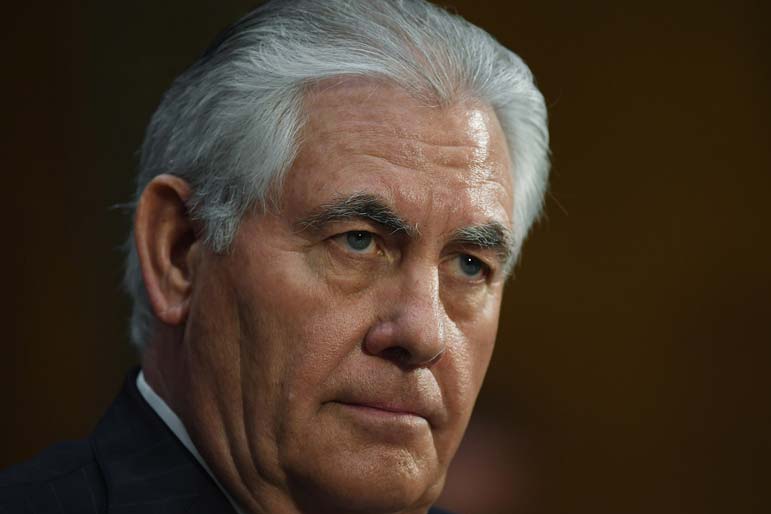 Secretary of State Rex Tillerson. Washington Post photo by Matt McClain
Secretary of State Rex Tillerson. Washington Post photo by Matt McClain
Secretary of State Rex Tillerson sought to defend broad and deep spending cuts in foreign aid on Tuesday before skeptical, often caustic senators who warned that slashing humanitarian and development funding would endanger national security.
"I think this budget request is radical and reckless, when it comes to soft power," said Sen. Lindsey Graham, R-S.C., chairman of the Appropriations Committee, which is examining the Trump administration's proposed $37.6 billion budget for the State Department and the U.S. Agency for International Development, a drop of about 30 percent.
Sen. Patrick Leahy, D-Vt., said the budget symbolizes a U.S. retreat from world leadership that China and Russia will rush to fill.
"Why would we give up that influence?" he asked. "Does it make us safer? Why would we want to let some of these totalitarian regimes expand their influence instead of American influence? Does that make us safer?
"We can't build a Fortress America," he concluded.
That message, delivered to Tillerson by both Republicans and Democrats, was the leitmotif throughout back-to-back hearings at the Foreign Relations Committee in the morning and the Appropriations Committee in the afternoon.
Although senators acknowledged that some change in the State Department is overdue, the budgetary approach Tillerson outlined was dismissed as penny-wise and pound-foolish, an aphorism repeated several times in both committees. Tillerson said that it is not fair to judge the effectiveness of foreign aid by how much money is spent.
"Throughout my career I have never believed, or experienced, that the level of funding devoted to a goal is the most important factor in achieving it," said Tillerson, former chief executive of ExxonMobil. "Our budget will never determine our ability to be effective - our people will."
Several other high-profile hearings were underway while Tillerson was on the hot seat, and most senators wandered away after grilling the top diplomat. In part that was an acknowledgment that the money Congress ultimately allocates to the State Department is going to be higher than the administration requested.
"I think you know that the budget that's been presented is not going to be the budget we're going to deal with. It's just not," said Sen. Bob Corker, R-Tenn., the Foreign Relations Committee chairman, who said that he quit reading line-by-line details after a few minutes because it bears no relation to what the final version will be.
If budgets are a statement of values, Tillerson argued that this budget does not mean that the United States under President Trump is retreating from global leadership as it asks other countries to do more.
German Chancellor Angela Merkel, among other leaders, has warned that allies cannot rely on the same set of assumptions about U.S. commitment and support. French officials have said Trump's decision to withdraw from the Paris climate accord, among other actions, is part of a deliberate reordering of post-World War II expectations.
But Trump's top diplomat said some world leaders are grateful for the clarity of Trump's expectations. He said he read Merkel's remarks, delivered after Trump's recent trip to Europe, as encouragement to her country to step up its defense spending and international obligations.
She was saying, "We should not look to America to carry us on their backs every step of the way," Tillerson said.
Tillerson also confirmed that the Trump administration will step back from some of the economic initiatives to Cuba begun under President Barack Obama.
Some of the U.S. effort is serving only to support the Castro regime, and there are no meaningful signs that the engagement is easing repression in Cuba, Tillerson said.
"We think we have achieved very little," he said.
But the heart of Tillerson's hearing was the competing visions for America as reflected in its foreign aid budget. Tillerson argued that the primary goal of government spending should be to protect Americans and advance the country's prosperity.
"The first responsibility of government is the security of its own citizens, and we will orient our diplomatic efforts toward fulfilling that commitment," Tillerson said.
But few senators went along with administration's view that big foreign aid cuts are needed to help finance increases in military spending. Graham came to the hearing equipped with visuals, including a blown-up quotation from Defense Secretary Jim Mattis, contending that a State Department that isn't fully funded means he must buy more ammunition.
"While I understand the need for hard power, I don't understand the need to cut soft power," Graham said. "This budget will cost influence. It's going to put lives at risk.
"Given our role in the world, we're sacrificing influence at a time when we need more," he added. "I don't want to retreat from the world right now."


 Contact The Editor
Contact The Editor
 Articles By This Author
Articles By This Author